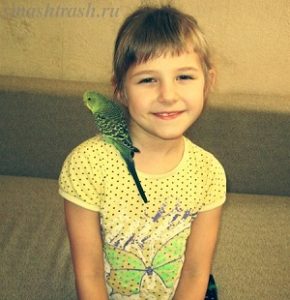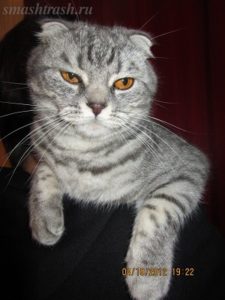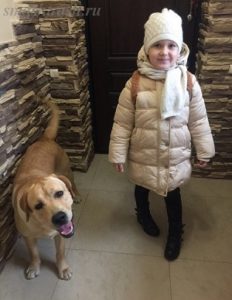
Pet is a tame animal that is kept at home. The most popular pets are horses, cats and dogs but with children smaller animals are often more popular, for example, goldfish, birds such as parrots, budgies and canaries, hamsters, white mice, rabbits, tortoises and guinea pigs. People keep them at home for different reasons, but mainly to provide companionship and amusement.
To my mind it is useful to keep pets, because from looking after their pets boys and girls can learn the meaning of responsibilities. As a rule, children are responsible for feeding and walking the pets and cleaning out their cages and boxes.
Elderly people prefer dogs and cats as pets. They are easier to look after and return affection. In particular they provide companionship which can be very important for a person living alone.
I’ve read a lot of interesting facts about dogs. For example, in the old days the ships usually had a Newfoundland dog on board the ship. If a sailor fell into the sea, the dog jumped in and rescued him. St. Bernard dogs are very good at finding lost people in the snow. They can smell a man under two metres of snow. The first guide dogs which helped blind soldiers from World War I were German. Guide dogs are usually Labradors or Alsatians.
VOCABULARY
tame — ручной
guinea pig /ˈɡɪni ˌpɪɡ/ — морская свинка
companionship — общение
canary /kəˈneəri/ — канарейка
in particular — в частности
obedient /əˈbiːdiənt/ — послушный
paw /pɔː/ — лапа
front paws — передние лапы
hind paws — задние лапы
claw /klɔː/ — когти
claw sharpener — когтеточка
kennel /ˈkenəl/ — конура
cage /keɪdʒ/ — клетка
encouragement — поощрение, ободрение
reward /rɪˈwɔːd/ — награда
to disturb /dɪˈstɜːb/ — беспокоить
to stroke /strəʊk/ — гладить животное
to rescue /ˈreskjuː/ — спасать tame
Questions for discussion

Have you got any pets?
What pet have you got?
What is its name?
What colour is your pet (dog/cat)?
How old is your pet (dog/cat)?
What is the breed of your dog?
It is clever, isn’t it?
How many tricks does it know?
Does your dog like to play with a ball?
How do you look after your dog? (Every morning I give him food and some water. I always feed my dog at regular times. Then I wash its bowl. In the evening I take my dog for long walks and then I brush his paws at home.)
What does your dog/cat like to eat? (It likes meat, bones, bread, milk, soup, porridge, potatoes, and sausages. Sometimes I buy some special food which is neatly packed in paper bags or tinned food.)
Do you train your dog to be obedient /əˈbiːdiənt/? (Yes, I do. I train my dog to fulfill my commands through encouragement and reward. I don’t allow my dog to be noisy and disturb the neighbours.)
Do you take your dog to the veterinarian? (Yes, I do it regularly. The vet gives him injections /ɪnˈdʒekʃən/ and some pills to avoid different diseases.)
Where does your dog live? (It lives indoors/outdoors in the kennel.)
In conclusion I should say that we understand each other without words. He likes me stroking his head and I’m very glad when he joyfully meets me from school. As the saying goes: “Dog is the man’s best friend”.
BREEDS OF DOGS
- bulldog /ˈbʊldɒɡ/ — бульдог
- boxer /ˈbɒksər/ — боксёр
- Great Dane — датский дог
- fox terrier /ˈteriə/ — фокстерьер
- bull terrier — бультерьер
- Scottish terrier — скотч терьер
- Yorkshire terrier/ˌjɔːkʃə ˈteriə/ — йоркширский терьер
- Pekinese dog /ˌpiːkɪˈniːz/ — пекинес
- spitz = Pomeranian dog /ˈspɪts/ — шпиц
- chow – chow /tʃaʊ/ — чау-чау
- husky /ˈhʌski/ — лайка
- Afghan hound /haʊnd/ — афганская борзая
- greyhound — английская борзая
- deerhound — шотландская борзая
- basset hound — бассет-хаунд
- blood hound — блад-хаунд
- Alsatian /ælˈseɪʃən/ (German sheepdog = a police dog = guide dog) — немецкая овчарка
- Caucasus sheepdog /ˈkɔːkəsəs/ — кавказская овчарка
- Scottish sheepdog = collie /ˈkɒli/ — шотландская овчарка
- Doberman pinscher — доберман
- Russian-European Shepherd dog — русско-европейская овчарка
- Dalmatian /dælˈmeɪʃən/ — далматинец
- Newfoundland dog — ньюфаундленд (водолаз)
- Bernard dog — сенбернар
- English setter — сеттер
- Schnauzer — шнауцер
- poodle (pigmy poodle) — пудель
- cocker spaniel /ˈspænjəl/ — кокер-спаниель
- dachshund /ˈdæksənd/ or /ˈdɑːks.hʊnd/- такса
- pointer — пойнтер
- pug dog /pʌɡ/ — мопс
- lap-dog — болонка
- gun dog — легавая
- Labrador /ˈlæbrədɔː/ — лабрадор
- Corgi /ˈkɔːɡi/ — корги (любимая порода королевы Елизаветы II)
- mongrel /ˈmʌŋɡrəl/ = mutt /mʌt/ — дворняга
Proverbs
- A cat has nine lives. — Живуч, как кошка.
- All cats are grey in the dark. — Ночью все кошки серые.
- Curiosity killed a cat. — Много будешь знать — скоро состаришься.
- A cat in gloves catches no mice. — Без труда не выловишь и рыбку из пруда.
- It is enough to make a cat laugh. — Курам на смех.
- Like a cat on hot bricks. — Сидеть, как на иголках.
- It’s raining cats and dogs. — Льет как из ведра.
- Barking dogs seldom bite. — Не бойся собаки, что лает, а бойся той, что молчит.
- Every dog has his day. — Будет и на нашей улице праздник.
- Love me, love my dog. — Кто гостю рад, тот и собачку его накормит.
Matching Task
- You can print English proverbs and their equivalents in your mother tongue (if there are any). Then cut them into stripes and ask students to match them. You could divide your class into groups. For this you have to make several sets of provers to hand out for your students. The winner is the team that is first matches all the proverbs correctly.
- You can cut into two pieces all English proverbs, mix them up and then ask students to match both parts of a proverb. The winner is the student who finishes first. In this case you might print a set of proverbs for each student.



Comment on “PETS”